|
(English translation below)
Durante mi estancia en el Centro de Atención a Migrantes Éxodo ha sido la adquisición de experiencia y de servicio a la comunidad migrante. En los meses que van de agosto- octubre trascurrido de este año, he podido observar que las personas migrantes traen un caso migratorio de violencia, pobreza, marginación, exclusión y de amenaza que conllevaron a la migración forzada, muchos de ellos era imposible regresar a sus países por la falta de seguridad y bienestar. Opinar sobre ¿Por qué no te quedas donde vives? ¿Porque te aferras a salir de tu país ? Son diferentes elementos que están entrelazados llevan a la idea de LA META ES PARTIR porque es la única alternativa que tienen. Nuestra Visión Es conocer los diferentes problemas sociales que existen. “un llamando a la solidaridad y empatía ”— Anahi San During my time at the migrant shelter (CAME) it has been the acquisition of experience and service to the migrant community. In the months from August to October of this year, I have been able to observe that migrants bring cases of violence, poverty, marginalization, exclusion and threats that led to forced migration, for many of them it was impossible to return to their countries due to the lack of security and well-being. What your opinions about why you have migrated: Why don't you stay where you are from? Why do you hold on the need to leave your country? There are different elements that are intertwined and lead to the idea of THE GOAL IS TO LEAVE because it is the only alternative migrants have. Our vision It is knowing the different social problems that exist “a call for solidarity and empathy”—Anahi San
0 Comments
109ª JORNADA MUNDIAL DEL MIGRANTE Y DEL REFUGIADO 2023 – Yadamy (English translation below)
En el marco de la Jornada Mundial del Migrante y del Refugiado, conmemorado el 24 de septiembre, el Centro de Recursos para Migrantes (CRM), ofreció un espacio para reflexionar y concientizar sobre el fenómeno migratorio en la frontera norte de México. En esta actividad participaron las personas voluntarias del CRM, los socios ministeriales de Frontera de Cristo, una familia con estancia en el Centro de Atención al Migrante “Exodus” (CAME), e invitados. Algunos voluntarios compartieron experiencias que han vivido en el CRM; mencionaron que las personas migrantes que han pasado por este lugar, se han sentido en un espacio seguro, que al brindarles agua y alimentos, ropa y calzado, pudieron sentir la hospitalidad y la calidez en un momento de dificultad. También se leyó el mensaje del Papa Francisco para la 109ª Jornada Mundial del Migrante y Refugiado, en este mensaje señaló que “es necesario un esfuerzo conjunto de cada uno de los países y de la comunidad internacional para que se asegure a todos el derecho a no tener que emigrar, es decir, la posibilidad de vivir en paz y con dignidad en la propia tierra”. Se recordó también que las personas son libres de elegir migrar o quedarse. La reflexión bíblica estuvo a cargo del pastor Marcos Adams, que tomó como base el texto de Hebreos 13: 1-2; Permanezca el amor fraternal. No os olvidéis de la hospitalidad, porque por ella algunos, sin saberlo, hospedaron ángeles. En nuestro caminar, hemos sido hospedadores de nuestros familiares, amigos y seres queridos, pero muy pocas veces nos hemos dado la oportunidad de hospedar a personas desconocidas, sin embargo ese es el reto para nuestra fe, el tener una actitud hospitalaria, sobre todo a aquellas personas que no conocemos. Mencionó que “en esta zona fronteriza de Estados Unidos y México, se pueden observar dos actitudes, una es la hospitalidad y otra la hostilidad. ¿Qué tipo de actitud estamos demostrando? ¿Nos encontramos en la región de la hospitalidad o de la hostilidad?”. En esta Jornada Mundial del Migrante y Refugiado, somos convocados a ser defensores y defensoras de los derechos del extranjero, a los que van de paso o los que deciden quedarse, pues el mismo Jesús fue un migrante y refugiado, quien tuvo la necesidad de ser acogido y sentirse en un espacio seguro. Dice el evangelio de Juan 11;53- 56: “Así que, desde aquel día acordaron matarle. Por tanto, Jesús ya no andaba abiertamente entre los judíos, sino que se alejó de allí a la región contigua al desierto, a una ciudad llamada Efraín; y se quedó allí con sus discípulos…Y los principales sacerdotes y los fariseos habían dado orden de que si alguno supiese dónde estaba, lo manifestase, para que le prendiesen”. De igual manera muchas personas mexicanas y de otras nacionalidades, pueden identificarse con Jesús, y sentirse a salvo al ser acogidos y bien recibidos. Por ello, desde nuestros lugares de incidencia, elijamos hoy a quién servir, si a la hospitalidad o a la hostilidad. – Yadamy (English translation) In the context of the World Day of Migrants and Refugees, commemorated on September 24, the Migrant Resource Center (CRM) offered a space to reflect and raise awareness about the phenomenon of migration on the northern border cities of Mexico. CRM volunteers, Frontera de Cristo ministry partners, and a family staying at the migrant shelter (CAME), and other guests participated in this activity. Some volunteers shared experiences they have lived through in the CRM; They mentioned that the migrants who have passed through this place have felt a safe space that provided them with water and food, clothing and footwear, and were able to feel the hospitality and warmth in a time of difficulty. Pope Francis' message for the 109th World Day of Migrants and Refugees was also read. In this message he noted that "a joint effort by each of the countries and the international community is necessary to ensure that everyone has the right to not migrate, that is, the possibility of having a life of peace and with dignity in one's own land.” It was also remembered that people are free to choose whether they immigrate or stay in their country of origin. The biblical reflection was led by Pastor Marcos Adams, who reflected on the text of Hebrews 13: 1-2; Let brotherly love remain. Do not forget hospitality, because for doing that some without knowing it have entertained angels. In our life journey, we have been hosts to our family, friends and loved ones, but very rarely have we given ourselves the opportunity to host strangers, however that is the challenge for our faith, to have a hospitable attitude, especially to those people we don't know. He mentioned that “in this border area of the United States and Mexico, two attitudes can be observed, one is hospitality and the other is hostility. What kind of attitude are we demonstrating? Are we in the place of hospitality or hostility?” On this World Day of Migrants and Refugees, we are called to be defenders of the rights of foreigners and migrant, those who are passing through or those who decide to stay, since Jesus himself was a migrant and refugee, who had the need to be welcomed and feel in a safe space. The gospel of John 11:53-56 says: “So, from that day they agreed to kill him. Therefore, Jesus no longer walked openly among the Jews, but he departed from there to the region adjacent to the desert, to a city called Ephraim; and he remained there with his disciples... And the chief priests and the Pharisees had given orders that if anyone knew where he was, they should alert them, so that they could arrest him. In the same way, many Mexican people and other nationalities can identify with Jesus and feel safe when they are welcomed and well received. Therefore, from our places of influence, let us choose today who to serve, will it be hospitality or hostility. You will get to a point one day, where this won’t be so hard, it won’t hurt so much.
This is what Margo Cowan, a woman who has been engaged with activism for over 45 years, told me as I walked her files into court last fall. It was my second week on the job, and in a plan to get to know me better, she asked how I liked my work with Keep Tucson Together. KTT is a new work placement for the TBYAVS, and it has been a lot of learning and growing for all involved. I went in knowing nothing about law or immigration. I also knew that I didn’t have the best boundaries when it came to work. That I have trouble separating areas of my life and not getting too focused on one thing that I forget other things around me. I knew going into, that this year was going to hold a lot of growth. Keep Tucson Together is an organization that strives to offer free legal services to undocumented families in Tucson that cannot afford a lawyer to represent them in immigration court. The organization started in 2011, helping people submit their DACA and citizenship applications. However, now, there is a growing need to defend people in deportation proceedings as cases that were closed 5 years ago are being reopened and more and more people are getting stopped for traffic violations and then deported. This year has brought me a constant awareness of the ways in which our government uses tactics of oppression to further instill racism fear into society. My first week on the job we discussed the importance of an A# or an alien #. The government refers to our clients not as people, but as aliens, and instead of going through the trouble of learning names, ICE assigns them #’s. My second week on the job, I attended my first Thursday night clinic and sat in on our team’s meetings with clients. I heard second hand through a translator the stories of people seeking political asylum, I heard of families whose son or sister or parent had gotten detained by Immigration and Customs Enforcement (ICE) because they weren’t wearing a seatbelt one afternoon and ICE was called because the driver didn’t have papers. The following Monday, I relived those stories again and again as I entered them into our database and then sent them by email to our lawyers and teams so that these folks could get help. Many emails came back with further questions, lawyers looking for more information that made this plea for asylum unique compared to the dozen that they heard earlier in the month. The first few emails, made me angry, why should it matter- why are we forcing people to relive their trauma’s? IF they were from Europe would we be needing as much information? When Margo told me at the end of my second week that I would one day build up a shell and that this work wouldn’t affect me, I didn’t believe her. How could I ever get used to these stories and become numb to all of the tears and panic that came into our office every day? In my first month with KTT I began to see through lawyer and volunteer interactions, through emails, the “numbness” that Margo was hinting at. However, I still wasn’t sure that becoming “numb” was possible for me. I did not see the value in it. Thirty-six weeks later, I am now beginning to unpack what she was saying that day. This numbness doesn’t mean the work no longer affects you, it’s that it doesn’t paralyze you. I began to understand that even though our lawyers and volunteers weren’t visibly distressed each time a new client’s story was heard, they still feel each one. Instead of getting upset and shutting down when I hear these stories, I now get angry when the 27th person comes to the clinic or calls us to explain their situation. I am angry because 27 people shouldn’t have to call in one day for a lawyer. They should not be sitting in a detention facility waiting to have their story heard. A story that 8 times out of ten, involves a loved one they know or themselves fleeing death threats after being kidnapped or harassed by a cartel. Two minutes before I got up to tell this story, I was replying to a comment on a Facebook post for the Justice for All campaign. I told you— it’s hard to put work aside! This campaign is fighting to create a public defenders office in Pima County strictly for folks in immigration court. To alleviate the workload that nonprofits like Keep Tucson Together are facing when taking on 700+ cases at a time. The saying, you have a right to an attorney and if you cannot afford one, one will be appointed to you, does not apply to non-citizens. Because in the eyes of Americans, if you are not a citizen you are not a person, you are an alien, why should you get a lawyer? I am channeling anger tonight because I have had to tell the 9th person on Facebook for the 27th time that to get here “legally” amounts to more than having money and waiting two weeks for a passport or visa. I am angry because no matter how many ways it gets said, some people still struggle to connect the dots. And it’s not their fault, the system that we play into has caused us to be this way, to feel this way- or really, to not feel at all. But, how can I share my thoughts about what I am learning at the border when people are too built into their systems to listen. What happens when everyone plays into this “numb” feeling and a person’s life becomes a case instead of a story. I now get angry instead of sad and in this current situation where KTT has 53 clients in ICE custody, in detention, awaiting infection, my blood is boiling and I challenge why more people’s do not. I am disgusted that our first question isn’t how can we help people who need help it’s, well are they here legally? When our second question isn’t how do we fix this, it’s how dangerous are these people? I am angry because I question how long social justice initiatives will have to keep fighting. I am angry now because some days, I wish I could live in Margo’s advice and be numb to the stories. To have this unawareness that friends, family, and Facebook strangers do. I am angry because as I am wishing for one day where I don’t have to be engulfed by work and immigration, I am also scared of becoming numb. It scares me to think that when this YAV year ends I will have the option not to think about the folks sitting in detention or being harassed by our government systems. It scares me to recognize the continuous battle in fighting the privilege to “numb out” and the challenge that comes with also taking time for self-care. As we approach week 44, the end of our YAV year, and possibly the end of my time in Tucson, I get scared of leaving all I have learned behind and turning back to “numbing out”. People’s stories should not have to go on display in order for us to understand their situation. Yet, I have been given the gift this year of true vulnerability in the clients I work with and a few friends I hold dear. Their vulnerability should not go unnoticed. They are “Rock Stars” as Margo often says– and in a world that is threatening to dim their light, their stories need to be heard. The lesson that this year has taught me and the feelings that I am left with are that we can’t numb out and get used to these stories. As tempting as it is, we can’t take the easy way out and avoid seeing these people as people. Because if we do that, the system won’t change, people won’t change. As scared as I am for this YAV year to end, that does not mean the learning ends. We live in a world that will always offer one more story. Two weeks after being in Tucson I went to a dinner event. While there I was sitting at a table with four people around my age and one older man. The older man asked every person at that table where they were from except he skipped over me. It was uncomfortable not being asked because I had been in the city for two weeks while everyone else had either lived in Tucson their whole life or a large portion of it. The man asking questions and I were the only white people at the table and the only two people who didn’t have to say where we were from. Being white, it was assumed by him that we belong. Even though in this instance, I most definitely didn’t belong. And even 7 months later, I still don’t belong. I am a migrant. I don’t belong in Tucson. I don’t belong to this city and this city doesn’t belong to me. I am just a temporary resident. But I don’t get questioned about this. In general, it is acceptable for me to be here, whether permanently or temporarily because I am white and I have a US passport. In claiming an identity as a migrant, I have began to wonder many things.
Why am I not called a migrant? I am praised for moving and traveling. I am told that I am “adventurous and brave.” But the people I have met who have to wait in Mexico while they petition for asylum are braver than me. I am not brave enough to move to a new country even though I have the choice, yet these people don’t have a choice. Their only option is asylum and they have endured much more than I have. They are brave and have taken a big journey in hopes of a safer and better life. Why is it beautiful and amazing for the Monarch butterfly to migrate across North America every year but its not ok for humans to do the same? Butterflies don’t need to be documented. There are no restrictions on where they can go and how they can live their lives. Why do humans need that? Am I a migrant that is “here to take people’s jobs”? The YAV program works hard to ensure that we are volunteering in supportive roles that wouldn’t be filled by locals were we not here, but where is the guarantee? I am only in Tucson to work for a year and leave. But it’s socially acceptable for me to do this. If I were born in Mexico would it still be acceptable? Why am I “legal?” Why can I travel 2,200 miles to be here in Tucson to work only for a year, while many people from the state of Sonora, Mexico (Arizona’s southern border) can’t travel the mere 150 miles to live in Tucson. Or even visit family and friends for a day. Many Sonoran’s would be considered “illegal” if they were in this city, but it is much closer to their home than mine. Why can’t we all be free? Free to move and live. Free to work and be in places where our lives aren’t in danger. Why do we have borders and walls restricting the movement of people and animals? Movement that has been happening before recorded history. Movement on land that doesn’t even belong to white people to begin with. Why do I get to migrate? What is the difference between myself and the migrant many are fighting against other than my skin color and my nationality? I have so many questions and so few answers. The more I seek the less I find. But I don’t want to stop seeking and questioning the injustices toward too many migrants in my country. This Christmas season has had a different meaning as I have had the opportunity to looked at it through the lens of the borderlands.
About a week before Christmas I had the opportunity to attend a bi-national posada. This posada took place on both sides of the border. Posadas are a Mexican tradition that focuses on the story of Mary and Joseph looking for a place to stay to give birth to baby Jesus. The bi-national posada paralleled the story of Mary and Joseph asking and being turned away from inns with those seeking asylum in the United States. We moved through stations of the posada singing a call and response song in which people on the Mexico side asked those on the US if they could come over, to help support their children and keep them from violence. The US side had a response for each verse rejecting and not listening to the needs of our neighbors. The last station of the posada, those on the US side of the border crossed into Agua Prieta and met at the gate of the Migrant Resource center, where people who are seeking asylum and waiting on the Mexico side until they are at the top of the list to have their cases heard. At this point those of us who are mostly U.S citizens that crossed the border joined the Mexico citizen that live in the community of Agua Prieta, all of us at the gates of the migrant center ask the asylum seekers if we can come into the center to join them. Even though the U.S side rejected the Mexico side in the previous parts of the posada, the migrants gladly welcomed us in to join the party. The next day I had the opportunity to attend a bible study in which we further discussed the story of Mary and Joseph. As I continue to live in the borderlands of this country in this time where immigration is one of our biggest issues dividing our nation, this story of Mary and Joseph being rejected and unwelcomed at the inn seems to resonate. Everyday people are coming to the United States looking for a place to safely care for their babies, their children, and a country that has more than enough, turns them away. Jesus was denied a place to stay and be born but still came and brought the world salvation. I think that there is a generation and children being born each day that like Jesus are coming to help save our world, to help and teach us to love our neighbors once more, to bring equality and end oppression and racism. But right now there is a generation and children soon to be born that are being rejected, being treated as criminals, and dying in the desert, instead of being welcomed and celebrated as though they just maybe the children born to save this world. On November 3 we were able to participate in the All Souls Procession: An annual Tucson event that, for almost 30 years, and is a beautiful space for creatively processing loss. I was told that this is specifically a procession and not a parade because it is designed to be participated in rather than just observed. The evening began with a celebration prior to the procession. The area where the procession was to begin was filled with food trucks, mariachi bands, and face painting. It was a joyful celebration. 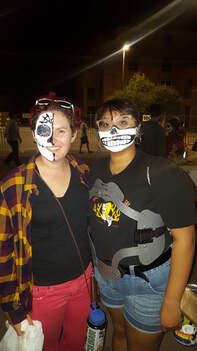 Ruby, my fellow YAV, and I got our faces painted too! Ruby, my fellow YAV, and I got our faces painted too! When the procession began, we stood to the side of the road a watched the Urn pass by. This was a spherical container to collect written names of those who were being grieved. The Urn led the procession and was followed by groups and individuals showing their mourning in a variety of ways. The woman who started this procession in 1990 did so as a way of publicly and artistically grieving the death of her father. This artistic foundation has continued and is evident throughout the event in the music, banners, and costumes. Many of these costumes were black or white to represent grief. Some had skeletons on them and many people had sugar skull art on their faces. Lots of the costumes were also adorned with lights and bright colors. Much like a parade, there were performers, bands, and church groups. It felt familiar, yet drastically different because every where I looked there was someone with stunning face paint of a sugar skull or a banner with images of someone who has died. 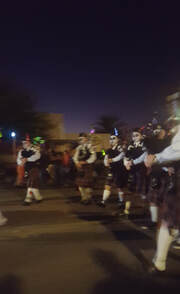 This group of people playing bagpipes and walking in the procession with their faces painted was my favorite part. As we walked the route they played Amazing Grace and many other songs. This group of people playing bagpipes and walking in the procession with their faces painted was my favorite part. As we walked the route they played Amazing Grace and many other songs. But that was beautiful in every way. The idea of being able to publicly grieve and be in community with thousands of people in their mourning process was an incredible experience. After watching for a while, were walked the two mile route with everyone as we all grieved. Even the many people just like me who didn’t make a sign for those that we love that have died were grieving. I had time during that procession to reflect on times where I have been grieving. To remember dead friends and family in an intentional way. And more importantly, in that moment, I was able to acknowledge the importance of that grieving space. Grief isn’t a process to get through and then check off as being done. It is on-going. During this event, the community grieved together for loved ones that have died both recently and many years ago. Other people were grieving for groups who have died or are victim to injustices of the world. For example, there was a group that was grieving the thousands of migrant deaths in the Sonoran Desert due to inhumane border policies. There were others wearing Black Lives Matter shirts to acknowledge all of the black and brown people who have needlessly died. As I think of the grieving process, I think of how in moments of grief, both years ago and more recently, I have felt the need to keep my feelings internalized and put on a happy face for everyone around me. I feel lots of cultural pressure always show only my best self and grief doesn’t easily fit into that picture. However, this public space of grieving made room for so many emotions. Everyone could celebrate the lives of loved ones and be sad that those people weren’t here to share in our daily lives anymore. And as a community there was support for everyone in each of our places of grieving. At the end of the processional route, everyone gathered at to see the lighting of the Urn, which was full of written names and objects remembering all those who were being mourned that night. It was a meaningful and symbolic way to end the procession but not put a camp on the grieving process. And the celebration continued after with more painting faces, eating, and music because even in grieving there is still room for love and celebration. “Quiero ser chef.” “I want to be a chef.” Braulio’s face lit up as he told me this during his legal screening. His cheeks rounded and his eyes brightened as a big smile formed. This was his response to my question, “Why did you leave your country?” In the hundreds of legal screenings I have done, I had not received such a precise, illustrative answer. I felt inspired by his enthusiasm, and I also smiled. The inspiration was replaced by dread fifteen minutes later when I had to mark Braulio’s intake with a “U.” U means unknown relief. U means that according to the information the child has disclosed during the screening, it is not clear that they are eligible for a visa. U means that Braulio’s intake will be put in a pile with others that we do not refer to an attorney once they are released and living in another part of the U.S. while in court proceedings. U means that Braulio will likely be deported. As I write the “U” on the upper corner of his intake, I feel a sinking in my stomach.
Wanting to be a chef, wanting to study or work, wanting to live with a parent or sibling who is already in the U.S., or wanting to escape extreme poverty and hunger is not enough. On intakes like that, I have to write a “U.” And don’t get me wrong, there are plenty of children I meet who are fleeing gang violence, who have been abused by their parents, who have suffered injuries because of working as small children in dangerous conditions. But there are others, like Braulio, who either do not disclose to me, or just honestly haven’t experienced such horrendous traumas. And without that compelling trauma, they are not eligible for any legal relief or any path to potentially stay in the U.S. This reality makes me feel frustrated, sad, hopeless. I am frustrated by a legal system that cannot serve Braulio. It is not that legal assistants like me and attorneys do not want to help kids like Braulio; of course we do! But there are so few attorneys and legal teams who are already working tirelessly to help children who DO have a strong case, who have experienced substantial trauma, and, therefore, might have a chance at obtaining a visa. In an overburdened legal system, strong cases must be prioritized. If a child is to receive legal assistance, the sadder, more traumatic the life story, the better! I am frustrated by policies that do not provide any options for people who are starving, who can no longer make a living due to global environmental and economic factors, or who want to be with family members who are already working in the United States to support their hungry, struggling loved ones back home. It is one thing to understand on paper that economic migration is not authorized, but it is another to look into a smiling child’s eyes when he says, “Quiero ser chef,” and know that he doesn’t stand a chance in this system. With these immigration policies and these inadequate legal systems, we as a nation are telling Braulio that he is unworthy. He is unworthy to share in what we have and enjoy everyday in this country. He is undeserving of the time and attention of attorneys. Braulio is marked with a U. He is unknown. I hope you all enjoy and learn something useful from this carefully crafted analysis of some of our shared values relating to my personal thoughts on the Border Immersion experience.
As a result of that week, I have been struggling with this idea of what is responsibility and what is my role in that? The word “responsibility” is built off the framework of the word response, or as an action verb, to respond. Now when you add the suffix -ibility (or ability) to the end the word literally translates to “the ability to respond or take action”. As I continue to perceive and bear witness to many events unfolding around me, I am left with one simple question. What is my personal and/or moral responsibility to respond and to what extent? Yet this opens even more avenues of exploration with even more questions to accompany it. This includes everything from the abstract and theoretical to the contextual and circumstantial. Then there is the question of where does my moral, ethical and personal values intersect in the face of all this??? In my struggles to try to perceive this issue from an open-minded angle I am again confronted with many contradictory facts and ideas that just seem to further compound the situation. I believe as part of our core being, we all struggle with this to some extent and fear where it may ultimately take us. This is often due to the answers lying outside our comfort zones in the realms of the unfamiliar. We are all, to some extent, quick to make assumptions on things at face value because it offers us an easy and simplified solution to difficult and often complex problems. This isn’t necessarily a bad thing though. In some cases, it can allow us to sort through large volumes of information so that we can get to the heart or core of the issue faster with less energy exerted in doing so. Unfortunately, this can also have far-reaching and often unintended consequences. In certain instances, we can quickly glance through information that may seem trivial to us in the moment but may contain important components that allow us to perceive and understand a problem in its entirety. In some instances, we can neglect to take responsibility and instead scapegoat the problem somewhere else. By doing so we are not only removing ourselves from the equation, but we are also essentially saying that the solutions are beyond us in a way that completely negates our ability to do something about it. One way we let go of our responsibility (and our ability to act) is through letting go of it in a way that places it somewhere else. This can be done through the act of blame which is defined in the dictionary as assigning responsibility for a fault or wrong. The word blame has many origins but in the Latin sense it comes from a word known as “blastemare” which translates roughly to “to accuse or place responsibility upon”. Blame and its historical origins may also have connections to the origins of another word we know of today as “blasphemy”. I personally found this to be very intriguing because of how this understanding of the blame could affect our ability to have free will over a given situation? In many instances, are we voluntarily limiting ourselves and our own ability to act? And, more importantly, are we exercising this in situations where we need this the most? In the face of all these questions I seemingly have no choice but to look to other sources. Perhaps at stories of when and where others have been confronted with this same dilemma. What were the conclusions in these situations? What about biblical narratives of people who were confronted with similar dilemmas? Two stories immediately come to mind. The first, the story of Adam and Eve. This narrative seems to have philosophical undertones relating to the initial roles of responsibility and blame in the context of the formation of later humans’ value systems. Now we must consider that, to a certain extent, these were individuals within a complex system and power hierarchy that was not fully understandable to them. We must then realize that many of us are in similar situation today, but… that still does not relieve them or us of our shared responsibilities in these situations. In this story let’s look at what happens after they had eaten the forbidden fruit. God, almost immediately, shows up and asks them to explain what has happened and where they have gone. After a bit of confusion Adam not only admits but blames his wife Eve for making them eat the forbidden fruit. Then, the next direct action is that Eve does the exact same thing to the snake. Would things have turned out differently if they had merely taken responsibility for their own personal role in the events that had just transpired? Possibly, but unfortunately those events never unfolded, and we are only left to guess. Maybe there is more to this story. First, some context clues. I believe that we can all come to an understandable conclusion that the God of the Bible is a God of order and not chaos. When God first comes to the garden who does he call first? God calls for the person in charge which was… Adam. This seems (from my perspective) like a logical and orderly way of getting to the heart of the situation (verse 9). Yet, Adam’s response was to cast blame on Eve, who then cast blame on the snake, but the snake said or did nothing in its defense. It is the very fact that the snake said nothing in response to these accusations that I found somewhat confusing. Maybe we can logically assume this is due to the snake having nothing to say or because there is an omitted piece of information that is understood. Maybe, but not likely. This information in question is that while Adam and Eve both cast responsibility of the situation onto the snake it did not return the favor or even attempt to defend itself. Perhaps, by placing blame onto the snake they unknowingly also cast away their responsibility as well. If this is true, then this also implies that the snake is the only entity going forwards (other than God of course) who has all the responsibility. God is a God of order, so I believe we can go forward logically if just like before; God will respond in a way that acknowledges that hierarchy. In the very next verse (verse 14) God responds to who first? God responds next by condemning the snake, then condemning the woman and reversing what she did by saying “Your desire will be your husband, and he will rule over you”, and finally by condemning Adam. Reversing the order of the previous interaction between them. Maybe I’m reading too much into nothing but if I haven’t this has far-reaching importance. This leaves me with one thought: “If there is truth to this, then did they unknowingly hand over control of the world to the serpent?” Let’s not forget about another biblical narrative. What about Jesus, the person who came according to the Biblical narrative to set it all straight? Time and time again we see Jesus taking responsibility and welcoming all of God’s creations into community with him regardless of their social, material, geographic, or physical standing in life. Jesus had every right to condemn and cast blame upon the unjust systems that would inevitably lead to his untimely demise. While he challenged many of the corrupt systems in place at the time, he also had this to say: “Brothers and sisters, do not slander one another. Anyone who speaks against a brother or sister or judges them speaks against the law and judges it. When you judge the law, you are not keeping it, but sitting in judgement on it. There is only one Lawgiver and Judge, the one who is able to save and destroy you. But you – who are you to judge your neighbor?” (James Ch. 4 v. 11 and 12). This sentiment is again echoed in the Sermon on the Mount when Jesus bravely professes to those who will listen by asking them how they can judge the speck of dust in their brothers and sisters’ eyes when they have not even begun to remove the plank from their own? A very hard-hitting question to say the least. Yet, despite seeing firsthand the ways humankind had corrupted a once pure world; Jesus still went forward and died as a “blameless” sacrifice for all regardless of this obvious fact. The fact that we were unworthy from every angle yet despite all this Jesus made us worthy by paying the ultimate sacrifice. God not only loved us before we learned to love, but God loved us even when we hated God. Now that is powerful. Yet, what about the people themselves who are affected today? Many of whom are fleeing failing states, extreme violence, inescapable poverty, and inner cities ruled by gangs. Those who hear of the American dream and hear the stories that America is a very charitable, wealthy country made up of a melting pot of immigrants from across the globe can’t help but want some of that for themselves. In their hour of darkness many of them cling to this as their only candle of hope to guide them through this void they are surrounded by. So, the question then becomes, “Why don’t they just immigrate here legally if things are so horrendous?” Well… many of them try… and fail. This is because our system of application and visa processing is prehistorically outdated and cannot handle the sheer volume of possible applicants for starters. To give you an idea the current process is so inefficient that it can take up to an estimated 30 YEARS to be accepted for even a legal residency position (otherwise known as a green card). All the while, waiting outside a port of entry having to fees associated with the review process during this ordeal without even a guarantee of acceptance. This is no opinion either; this is what is currently being expressed to us by many who work in this field including lawyers who work in the courts, advocacy groups, and those we spoke with in the border towns of Aqua Prieta and Douglas. And just when it couldn’t get any more complicated… we haven’t even discussed asylum seekers, or those who are fleeing extreme persecution in their home countries or are under the threat of death/torture if they ever return. I just want to finish by saying how thankful I am for all of you who take the time to read these entries and stay updated about this journey. I look forward in the new year to continuing to inform you all with updates about my time here. Until then, Happy New Year! 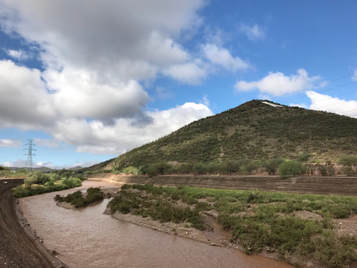 Picture taken of Santa Cruz River on September 20th Picture taken of Santa Cruz River on September 20th My year as a Young Adult Volunteer (YAV) in Tucson, Arizona is officially underway. These past three weeks have been filled with a mix of joys, challenges, and everything in between. Yet one common thread that has defined my time here thus far is firsts. As a YAV in Tucson, I have experienced foreign and new situations on an almost daily basis. Below, I will reflect on some of my most significant firsts during my brief time here. First Time in a Desert During my first few days of exploring Tucson, a thought kept running through my head: “where is the green in this barren city?” Coming from a city of trees and manicured lawns, the site of dirt and gravel stretching in all directions was a stark change. Upon looking at a map of the city on my phone, I noticed several blue lines running through Tucson. Recalling the rivers and watering holes that dotted the Central Texas landscape, I was eager to see a splash of blue in the desert. However, every time I rode over one of those blue lines on my bike, I found that they were simply dry creek beds, and water only runs through them a few times a year. It was during these moments that I fully began to understand just how different of a place I had entered into. Three weeks in, and I still sometimes miss the site of grass or a flowing river, but I am no longer think of Tucson as “barren.” The city is abound with various types of wildlife, flora, and natural splendor. It is simply different than where I came from. Then, just today, I drove over a fully running river. It was full from a day of rain, and was strikingly beautiful against the backdrop of the rugged desert landscape. As my time here progresses, I hope to continue to find beauty in the desert. 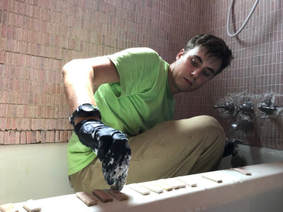 laying tile! laying tile! First Time at CHRPA For several weeks now, I have worked as a volunteer for Community Home Repair Projects of Arizona. This organization provides free emergency home repairs and handicap modifications to low-income and elderly residents of the Tucson area. As I have no previous handy-man or construction experience, everyday at CHRPA brings a new first. So far, I have had to learn how to fix a cooler, build a wheelchair ramp, replace a toilet, install a new sink faucet, and put in a door. Other new experiences this job has brought about include waking up before the sun rises, biking to work, and riding the bus. To say I am out of my element would be an understatement. It is hard work, and sometimes I feel like I get in the way more than I help when making a repair. I also find myself tired, sore, and most of all, hot. All this being said, I am amazed at the knowledge and passion of my coworkers and the lengths they go to in order to help the residents of Tucson. I have only begun to see the impact CHRPA has on people’s lives, and while it is difficult work that often leaves me frustrated, I feel proud to be part of this organization. First Time at an Immigration Shelter During our first week in the city, the Tucson YAV house volunteered with the Inn Project. The project is run through First United Methodist Church of Tucson, and provides a shelter for primarily Central American asylum seekers recently released from detention. Most refugees stay in the shelter before going on to their families in the United States who they will be staying with while their asylum application is processed.The shelter is set up in the church’s basement, and provides individuals with a place to sleep, three meals a day, and food and water for their upcoming journey. On the day we volunteered, 42 individuals were residing at the shelter. Immigration is an issue that I have learned about primarily through my wife, Dakota, who has worked extensively with immigrant communities through various non-profits. However, this was my first time being face to face with people who had just been released from immigration detention facilities. With my limited Spanish, I struggled to communicate effectively with those we were helping, but all expressed immense gratitude towards us for volunteering. Most were families, and all seemed tired yet excited to soon have the opportunity to see their family in the United States. As I was leaving, I had the feeling that if more people could spend a few hours with those most impacted by our immigration system, the debate surrounding immigration would be quite different. First Time Fixing a Flat Tire Finally, I fixed my first ever flat tire on a bike during this past three weeks. In fact, I fixed my first nearly two weeks ago, and have since had to fix four more flats. With a plethora of thorny plants and frequent potholes, Tucson may well by the flat bike tire capital of the United States. These flat tires shattered my vision of what community by bike would be like. Before I started as a YAV, I had an hour round trip commute in my car, and I was eager to trade driving for the simplicity and free exercise that come with biking. It turns out, bikes are not the simplest of machines to maintain, and just like a car, regular maintenance is required. On one particularly hot day, I found myself changing a flat tire on the side of a busy street. At that moment, all I wanted was my car, which happens to be sitting with my parents a thousand miles away. The very next day however, I found myself biking to work with a repaired tire, a cool morning breeze in my face, and a view of the sun rising over the Tucson mountains. Often during these past three weeks, the experiences that have brought me the most frustration and the most joy have been one in the same. Thank you for taking the time to read this post! Have a great weekend and stay cool. Peace, Tanner Doy gracias a Dios por la vida y la salud que nos presta y sobre todo por permitirme ser voluntaria en el programa YAV gracias a esto he visto y he aprendido demasiado, claro que aveces no es fácil pero de alguna manera salimos dando lo mejor; el mes pasado tuvimos la oportunidad de ir a la frontera a una introducción fronteriza y lo que aprendí fue impactante aparte he estado viendo las cosas desde otra perspectiva ya que es diferente la historia cuando estás de otro lado y en este caso yo estoy aquí como una migrante en otro país aprendido día a día las cosas que no podía ver.
Espero les guste. Migración? La detención de migrantes en México pasó de 86.298 en 2015 a 198.141 en 2016; en los primeros siete meses de 2017 ya se han llevado a cabo 99.768 detenciones. Al mismo tiempo, las solicitudes de asilo están en aumento, pasando de 1.296 en 2015 a 3.424 en 2016; en los primeros seis meses de 2016, México ya ha recibido 3.486 solicitudes, el número más alto del que se tiene registro. Para 2016 y 2017; más del 92 por ciento de las solicitudes de asilo son de ciudadanos de Honduras, El Salvador y Guatemala. Hay, además, otros problemas de mayor gravedad, como la caza de inmigrantes por grupos de civiles, que, evadiendo la vigilancia de la patrulla fronteriza, atacan con armas de fuego el paso de éstos. Una situación que recientemente se reconoció y que tiene relación con la continuación de la violencia sobre los derechos humanos de estas personas. Lo que a mí más me duele ver en el caso de migración es que muchos niños desde chicos ya están pensando en emigrar a los Estados Unidos y hay veces que no van acompañados de ningún tutor o alguien responsable muchas veces la misma falta de trabajo o falta de recursos te obliga a salir de tu casa en busca de un futuro mejor, una oportunidad para salir adelante, pero es en realidad un camino fácil?, además de ser engañados por su pollero o la persona que los ayuda a cruzar se arriesgan todas los hombres, niños, mujeres al secuestro , abusos sexuales, asaltos , maltrato etc. Viendo un documental de niñas que emigraron pude ver el gran infierno que pasan ellas sufrieron abuso sexual, psicológico y maltrato pasaron por mucho e incluso estuvieron muy cerca de morir para ellas todo estaba perdido y me dejaron como un mensaje por mi mente paso ellas pasaron todo eso solo por querer oportunidades y es ahí cuando te das cuenta y te preguntas ¿Qué está haciendo mi país con esto? ¿mi gobierno sabrá de toda esta situación? Pero tristemente se ve claramente la ignorancia de muchos que están sobre nosotros. Cada vez hay más pobreza, mas corrupción, más muertes, gente que se hace más rica y sobre todo más y más ignorancia. A pesar de esto seguimos habiendo personas apoyando esta situación apoyando a emigrantes y tratando de que menos gente muera por esta causa. ¿No podemos nosotros convencer a la gente que no emigre porque a quien se le niega la oportunidad de una vida mejor? Pero hay una cosa que creo que todos podemos hacer y eso es apoyar a que menos gente muera tratando de ir en busca de un sostén para la familia, una mejor educación, un mejor trabajo, algo mejor. Cuando tú mismo país no te lo puede dar al contrario trata de burlarse de ti poniendo más obstáculos más barreras más muros sea Dios en sus corazones y les de la visión para que se den cuenta de todo lo que está pasando afuera de sus mansiones de su círculo de niveles y sobre todo que les de la sabiduría de gobernar este país. Dios sea con nosotros y nos del corazón y la buena voluntad. ´´Por qué no nos ha dado Dios espíritu de cobardía sino de poder, amor, y dominio propio 2 Timoteo 1-7´´ |
Archives
June 2024
Categories
All
|
Tucson Borderlands YAV
|
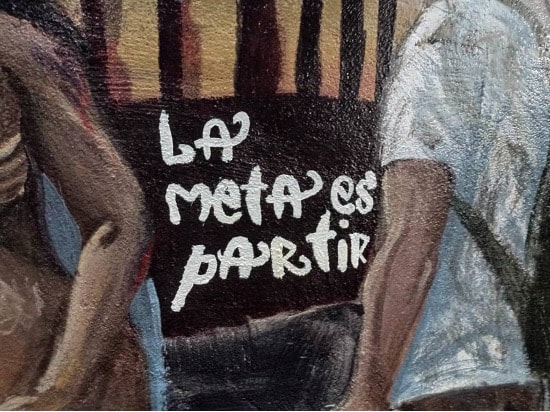
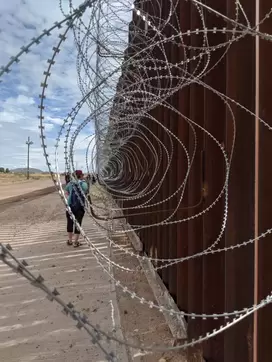
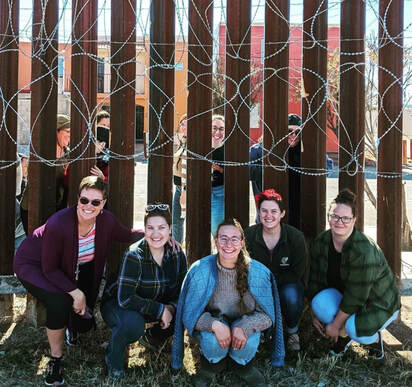
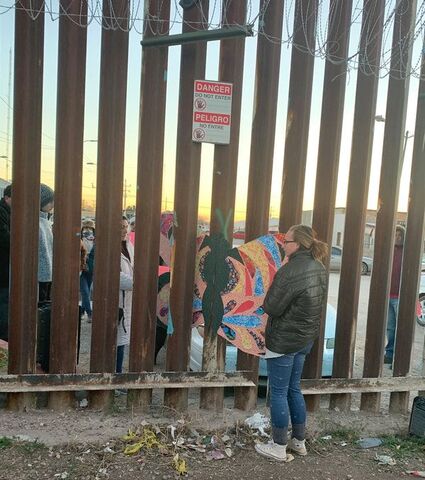
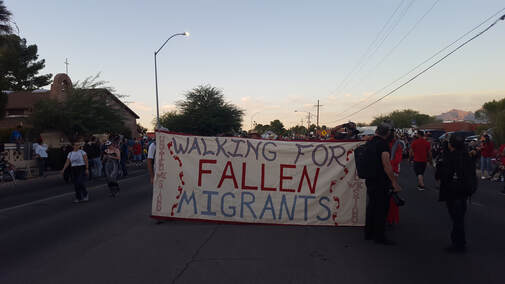
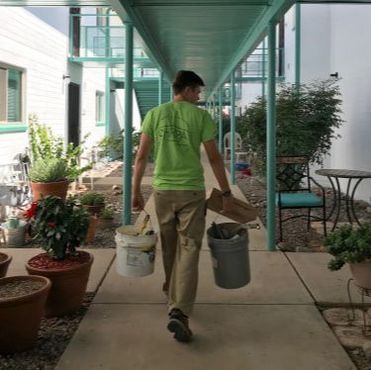
 RSS Feed
RSS Feed
